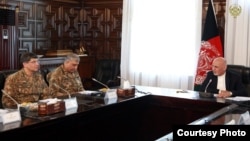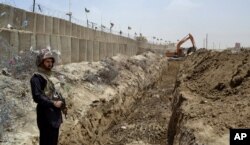Pakistan’s military chief, General Qamar Javed Bajwa, held “candid and “constructive" talks with Afghan leaders on bilateral relations and ways to enhance mutual cooperation to fight terrorism.
Accompanied by the chief of Pakistani spy agency, ISI, the general met Sunday with Afghan President Ashraf Ghani at the presidential palace in Kabul. The Afghan defense minister and the national security advisor among others assisted Ghani in the discussions, officials said.
“Both sides discussed regional security, bilateral relations, fight against terrorism, trade and transit,” according to a brief statement issued by Ghani’s office after the meeting.
It quoted the Afghan president as saying the time has come to take practical steps toward creating an atmosphere of mutual trust. The statement added Pakistan assured of its readiness to cooperate in tackling the threat of terrorism facing both countries and supported Afghan-led efforts to promote peace.
The meeting was “candid, positive, respectful, constructive and encouraging in a long time,” said Afghan ambassador to Pakistan, Omar Zakhilwal, who also attended the talks.
Bilateral ties have been marred by mistrust and suspicion, with both Islamabad and Kabul routinely blaming each other for backing fugitive anti-state militants to plot terrorist attacks against the other.
During the one day visit, General Bajwa had been expected to reiterate offers of training for Afghan soldiers and police personnel in Pakistani institutions and emphasize the need for the two countries to resolve differences by relying on bilateral mechanisms and dialogue, according to officials in Islamabad.
Insurgents gaining ground
The U.S.-backed Afghan government insists that sanctuaries on Pakistani soil have enabled the Taliban to sustain and expand insurgent operations in Afghanistan during the past 16 years. Recent assessments have put the Islamist insurgents in control of more than 40 percent of Afghan territory.
Pakistani authorities deny charges they are supporting the Taliban. In turn, they blame the Afghan intelligence agency for sheltering fugitive anti-state militants who are plotting deadly attacks against Pakistan.
Washington supports the Afghan assertions. President Donald Trump unveiled his new strategy for the Afghan war in August, and he criticized Islamabad’s counterterrorism efforts and urged the country to undo terrorist havens on its soil.
Pakistan: Failures aren't ours
Islamabad insists it is being scapegoated for failures of the U.S.-led international efforts to defeat the Taliban and stabilize Afghanistan.
The Pakistan military says its sustained counterterrorism operations in the past few years have dismantled all “militant hideouts” in the country. It also cites the building of a fence and new security outposts on its nearly 2,600-kilometer border with Afghanistan.
Officials say the border management project is expected to be completed within the next two years and is key to deterring illegal infiltration along a largely porous frontier.
The Pakistani government also has been campaigning for resolving the Afghan conflict through peace talks between Kabul and the Taliban, and it strongly opposes further militarization of the war, already the longest overseas military engagement in the U.S. history.





